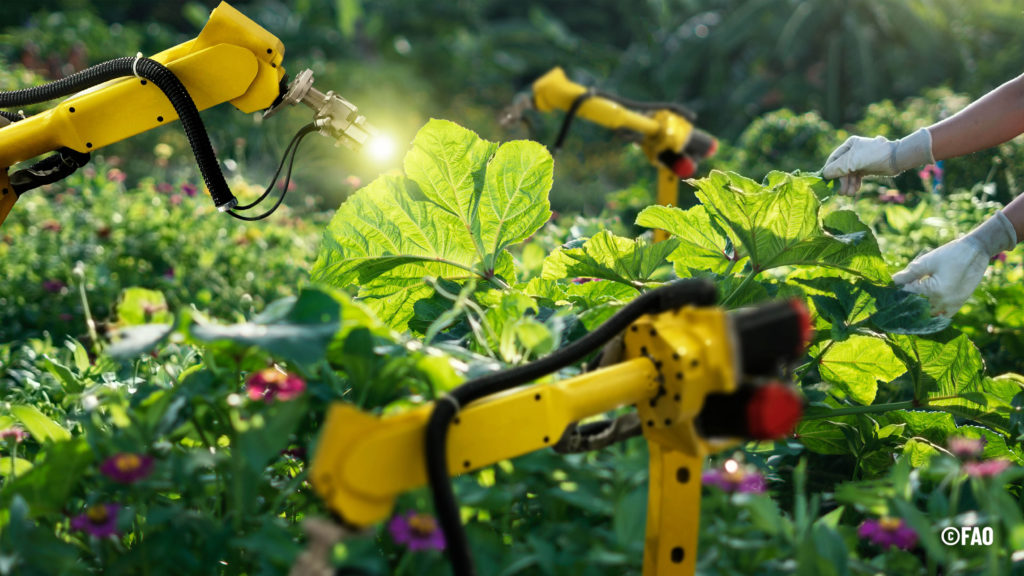The State of Food and Agriculture 2022 (SOFA) also addresses the potential impact of this
technological change on job displacement and unemployment.
November 02, 2022, Santiago, Chile- Automation in the early stages of the food supply chain can
support sustainable and inclusive productivity gains in agrifood systems and contribute to achieve the
Sustainable Development Goals, says the latest report by the Food and Agriculture Organization of the
United Nations (FAO) on The State of Food and Agriculture 2022 (SOFA).
The report states that agriculture automation, including using tractors or artificial intelligence, can
increase productivity and resilience, improve product quality and resource efficiency, reduce human
labor and labor shortages, improve environmental sustainability, and facilitate climate change
adaptation and mitigation.
The report analyzes 27 case studies on the use of technology at different stages of development and
identifies the various barriers that may impede its application, especially by small-scale producers.
Based on this analysis, the publication suggests policies to ensure that agricultural automation is
inclusive and contributes to sustainable and resilient agrifood systems.
However, the report also analyzes that the adoption of new technologies, access to which still tends to
be limited, can also deepen inequalities, especially if it remains inaccessible to smallholders and other
marginalized groups, such as youth and women.
Finally, the SOFA addresses the widespread concern about the potential negative impacts of labor-
saving technological change in terms of job displacement and unemployment. While it concludes that
such fears are overblown, it recognizes that automation in agriculture can lead to unemployment where
rural labor is abundant, and wages are low.
“FAO is convinced that without technological progress and increased productivity, it is not possible to lift
hundreds of millions of people out of poverty, hunger, food insecurity and malnutrition,” FAO Director-
General QU Dongyu wrote in the report’s foreword. “What matters is how the automation process is
carried out in practice, not whether it occurs or not. We must ensure that automation is carried out
inclusively and promotes sustainability.”
Uneven progress around the world
Motorized mechanization has been an important form of automation in agricultural production and a
key component of a global transformation. However, its adoption has been uneven in different parts of
the world. One example is the available statistics on the number of tractors per 1,000 hectares of arable
land worldwide, which show the uneven progress towards mechanization in different regions of the
world.
Latin America and the Caribbean has shown considerable progress in mechanization, driven by farming
system evolution, structural transformation, and urbanization. The number of tractors per 1000
hectares of arable land almost tripled from 5 in the 1960s to 14 in the 2000s.
The SOFA reports that in the region, it was private actors that drove agricultural mechanization.
However, governments also played a key role, creating an enabling environment for mechanization, for
example, through public programs developed by governments in Argentina, Costa Rica, Ecuador, and
Peru, which provided access to credit at low-interest rates and tax exemptions. In addition, several
countries, such as Peru, exempted agricultural machinery from import duties.
Policy recommendations
The general principle of the policy recommendations offered in the report centers on the idea of
responsible technological change. This involves anticipating the impacts of technologies on productivity,
resilience and sustainability while focusing on marginalized and vulnerable groups.
The key here is to create an enabling environment that requires a range of policy instruments to work
together coherently. These include legislation and regulation, infrastructure, institutional arrangements,
education and training, research and development, and support for private innovation processes.
Efforts to reduce the uneven spread of automation should include inclusive investments involving
producers, manufacturers, and service providers, with particular attention to women and youth, to
further develop technologies and adapt them to the needs of end users.
In addition, investments and other policy actions designed to promote responsible agricultural
automation should be based on context-specific conditions, such as the state of connectivity, challenges
related to knowledge and skills, adequacy of infrastructure, and inequality in access. Even biophysical,
topographical, and climatic conditions play a role. For example, small machinery and even manual
equipment can benefit smallholders in hilly terrain.



